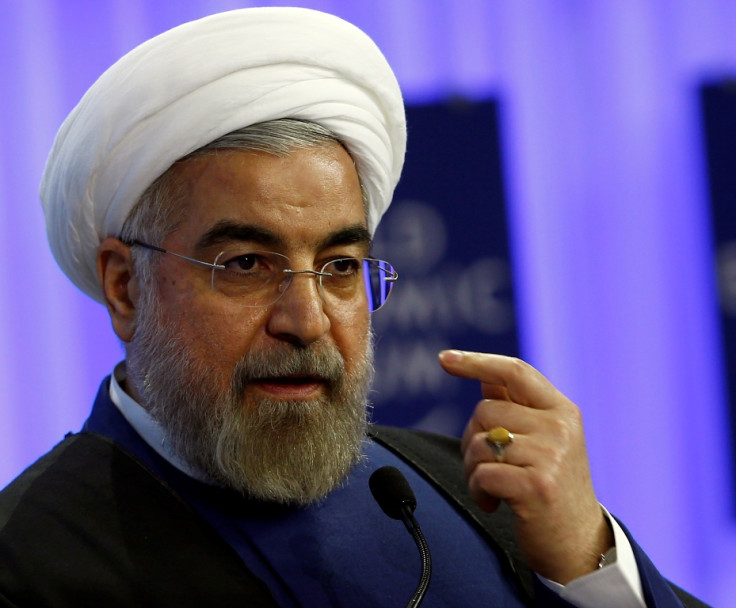Iran's Non-Oil Exports Recovering Under President Hassan Rouhani

Iran's non-oil exports are beginning to feel the benefits of easing international tensions under new president Hassan Rouhani, according to Iranian manufacturers at one of the world's largest food industry shows.
Organisers of the annual Gulfood fair in Dubai said 46 Iranian firms exhibited their merchandise at this week's event; nearly double last year's number – an indication of Iran's partial return to the global trading system since Rouhani took over in August 2013.
However, international banking sanctions remain in place, making it hard for some Iranian firms to receive payments for their exports, and difficult business conditions at home continue to impair growth.
Exports Rise
Reza Rajabinasab, export manager at Amadeh Laziz, an Iranian maker of instant noodles, soups and other food products told Reuters his company's exports, worth millions of dollars a year, had risen 10% to 15% since Rouhani assumed power.
Iran Dairy Industries Commercial, which sells to Iraq, Pakistan and Malaysia and other countries, said exports for the first 10 months of the Iranian year, which began 21 March 2013, had jumped to $15m from $9m in all of the previous year.
Iran exported $29.24bn (£17.54bn, €21.25bn) of non-oil goods in the first nine months of the Iranian year, according to customs data quoted by local media. While that was down 7.7% from a year earlier, many Iranian businessmen at Gulfood, a five-day event that ends 27 February, said the trend had turned positive over the last few months.
The US does not want Iran's trade to rebound until Tehran reaches a final agreement on its nuclear program. President Barack Obama said earlier in the month that he would come down like a "ton of bricks" on companies violating sanctions.
As such, most banks around the world - even in Dubai, a hub for Iranian business – continue to refuse to handle trade payments for Iran. This forces firms to adopt costly, awkward methods such as barter - Amadeh Laziz accepts shipments of food and raw materials as payment for some of its exports.
Nonetheless, Rouhani's diplomacy seems to be helping Iranian exporters in at least two ways.
He has stalled wild fluctuations of the rial currency, which lost about 50% its value against the US dollar in 2012.
With the risk of an immediate crisis over the nuclear programme diminishing, foreign buyers of Iranian products also feel safer signing contracts.
"The stabilising of the dollar has helped a lot and decreased the risk of doing business. It's stabilised our prices," said Mohammad Ali Khoshbin, an executive at the Khoshbin Agro Group, which exports raisins and pistachios to Europe and North Africa.
"Definitely, Europe has been in more contact with us" since Rouhani took office, Khoshbin told the news agency.
Domestic Environment
Companies can't work well if they face interest rates above 20%, compared to 3%, 4% or 5% for their competitors abroad.
"Companies can't work well if they face interest rates above 20%, compared to 3%, 4% or 5% for their competitors abroad," said Ali Shariati Moghaddam, general director of Novin Saffron, which exports $30m to $40m of saffron a year.
Iran's export industries have suffered years of chaotic economic management by Rouhani's predecessor, Mahmoud Ahmadinejad. For instance, interest rates have had to be raised to offset high inflation.
Ahmadinejad imposed a 7% tax on dairy exports in order to ensure domestic supplies, but this backfired when some farmers lost money and slaughtered their cows, an official at Iran Dairy said. Rouhani revoked the tax, he added.
However, there are indications that the Rouhani administration is starting to amend some of the most hurtful policies for business, executives said.
Sanctions
Opec-member Iran's oil exports, which typically made up about 75% of its total exports, have dropped by more than half since 2011 owing to sanctions, imposed over qualms that Iran was trying to develop nuclear weapons.
The collapse made non-oil exports such as food, not banned by sanctions, more important to the nation as it battles a recession and high inflation.
© Copyright IBTimes 2025. All rights reserved.






















